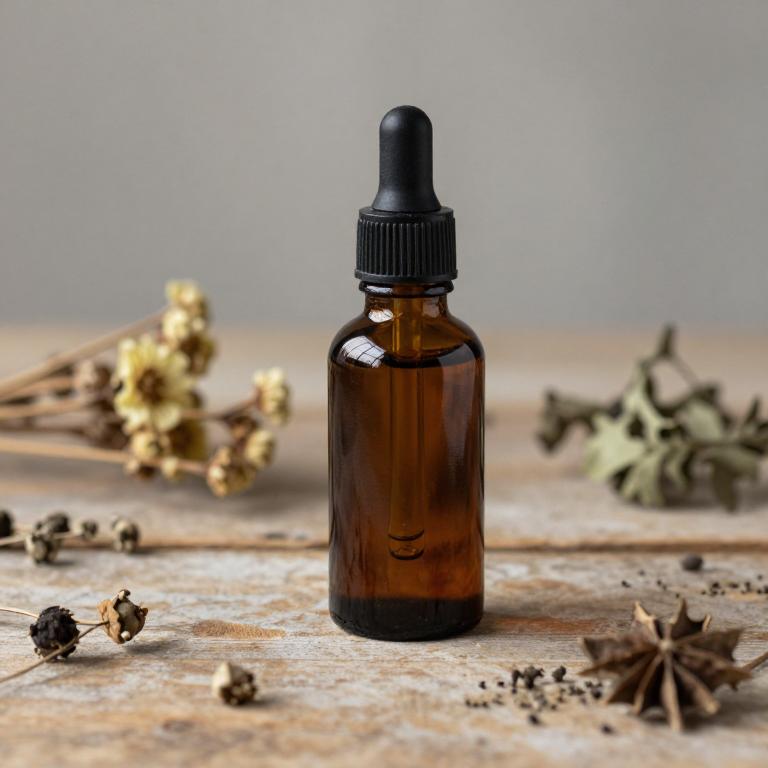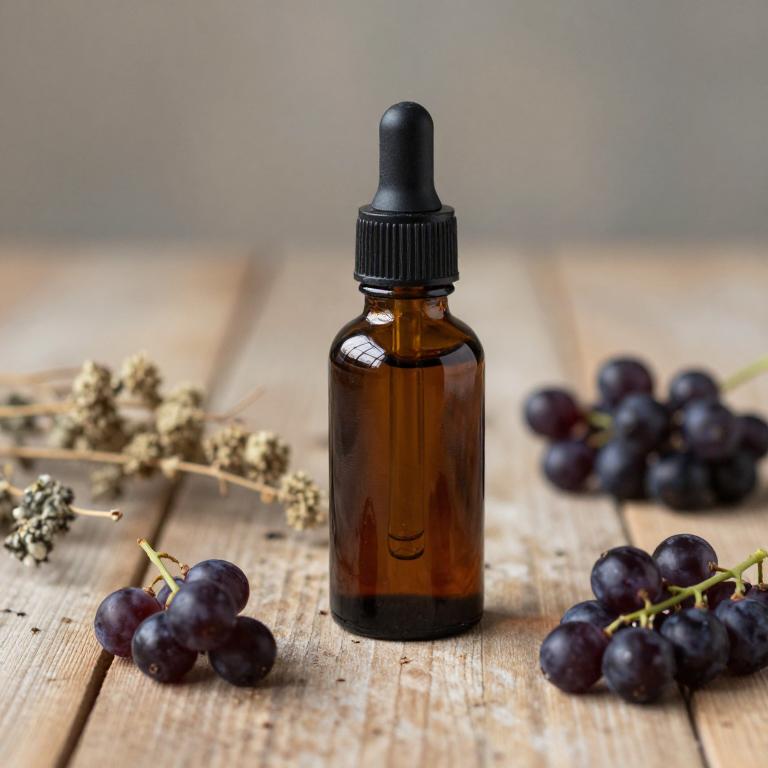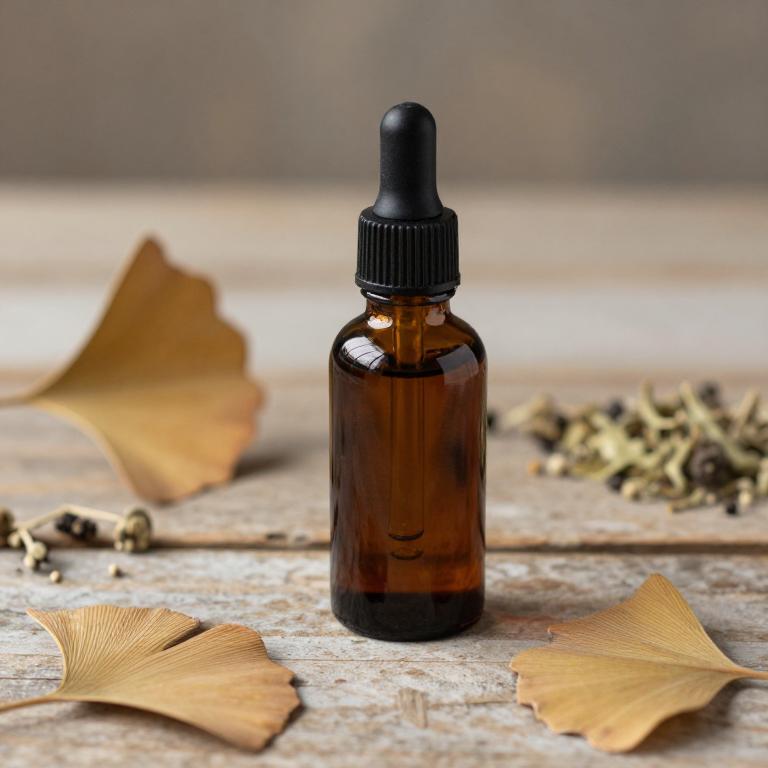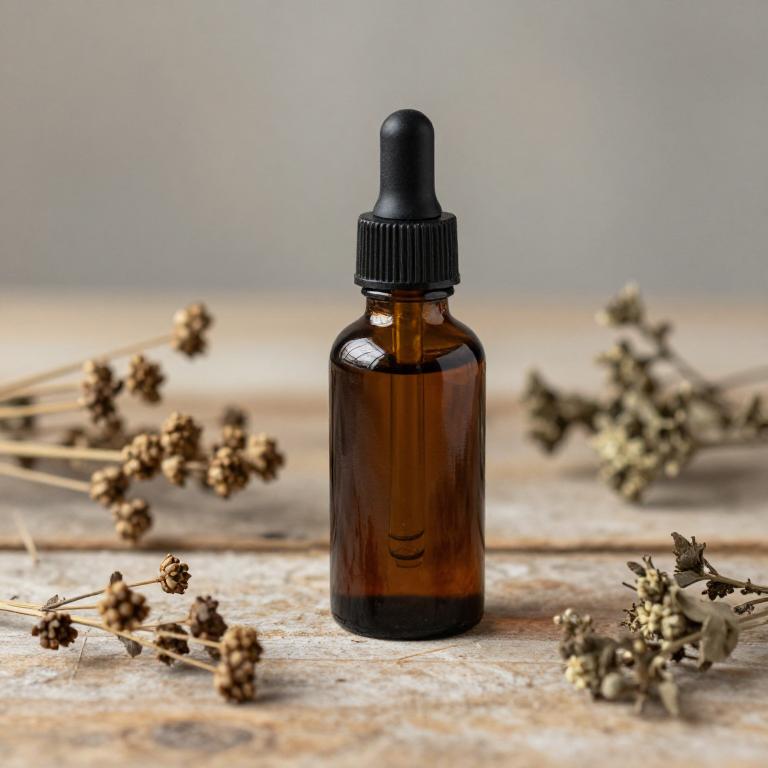10 Best Herbal Tinctures For Varicose Veins

Herbal tinctures for varicose veins are concentrated liquid extracts made from various plants believed to support vascular health and circulation.
Common ingredients include horse chestnut, garlic, ginger, and gotu kola, each known for their potential to reduce inflammation, strengthen blood vessel walls, and improve blood flow. These tinctures are often used as complementary therapies alongside conventional treatments, though they should not replace medical advice or prescribed medications. They are typically taken orally or applied topically, depending on the formulation and the specific herb used.
While some studies suggest they may offer symptomatic relief, more research is needed to fully understand their efficacy and safety.
Table of Contents
- 1. Horse chestnut (Aesculus hippocastanum)
- 2. Thistle (Silybum marianum)
- 3. Common grape (Vitis vinifera)
- 4. Stinging nettle (Urtica dioica)
- 5. Blessed thistle (Cnicus benedictus)
- 6. Dog rose (Rosa canina)
- 7. Ginkgo (Ginkgo biloba)
- 8. Field horsetail (Equisetum arvense)
- 9. St. john's wort (Hypericum perforatum)
- 10. Ginger (Zingiber officinale)
1. Horse chestnut (Aesculus hippocastanum)

Aesculus hippocastanum, commonly known as the horse chestnut tree, has been traditionally used in herbal medicine for its potential benefits in treating varicose veins.
The active compounds in its bark and seeds, such as aescin and flavonoids, are believed to improve venous tone and reduce inflammation, which can alleviate symptoms associated with varicose veins. Herbal tinctures made from Aesculus hippocastanum are often taken internally or applied topically to promote circulation and reduce swelling in the legs. These tinctures are typically diluted in alcohol and may be used as part of a holistic approach to managing venous insufficiency.
However, it is important to consult a healthcare professional before using these tinctures, as they may interact with certain medications or have contraindications for some individuals.
2. Thistle (Silybum marianum)

Silybum marianum, also known as milk thistle, is a herbal plant that has been traditionally used for its potential health benefits, including support for liver function.
While it is not a primary treatment for varicose veins, some studies suggest that its active compound, silymarin, may help improve circulation and reduce inflammation, which could indirectly benefit individuals with varicose veins. Herbal tinctures made from Silybum marianum are often taken orally and may be combined with other circulatory-supporting herbs for a more comprehensive approach.
However, it is important to consult with a healthcare provider before using these tinctures, as they may interact with other medications or have side effects for certain individuals.
3. Common grape (Vitis vinifera)

Vitis vinifera herbal tinctures, derived from the seeds of the grape vine, are traditionally used to support circulatory health and alleviate symptoms associated with varicose veins.
These tinctures are believed to enhance blood flow and strengthen vein walls through their rich content of resveratrol and other bioactive compounds. They are often recommended as a complementary therapy to help reduce swelling, discomfort, and the visible appearance of varicose veins. While scientific evidence supporting their efficacy is limited, many users report positive effects when used consistently as part of a holistic treatment plan.
As with any herbal remedy, it is important to consult with a healthcare professional before beginning use, especially for individuals with existing medical conditions or those taking other medications.
4. Stinging nettle (Urtica dioica)

Urtica dioica, commonly known as stinging nettle, has been traditionally used in herbal medicine for its potential benefits in improving circulation and reducing inflammation.
When prepared as a tincture, Urtica dioica is often used to support the treatment of varicose veins by strengthening blood vessel walls and promoting better venous return. The active compounds in stinging nettle, such as flavonoids and silica, are believed to enhance capillary function and reduce swelling in the legs. Herbal tinctures made from Urtica dioica are typically taken orally, often in combination with other circulatory-supporting herbs like horse chestnut or butcher’s broom.
While generally considered safe, it is advisable to consult with a healthcare professional before using Urtica dioica tinctures, especially for individuals with existing health conditions or those taking medications.
5. Blessed thistle (Cnicus benedictus)

Cnicus benedictus, commonly known as blessed thistle, is a herbal remedy that has been traditionally used to support circulatory health and alleviate symptoms associated with varicose veins.
Its tinctures are believed to enhance blood circulation and reduce inflammation, making them a popular choice for individuals seeking natural relief from venous insufficiency. The active compounds in Cnicus benedictus, such as flavonoids and essential oils, are thought to strengthen blood vessel walls and improve the flow of blood back to the heart. While some studies suggest potential benefits, it is important to consult a healthcare professional before using these tinctures, as they may interact with other medications or have side effects in certain individuals.
Overall, Cnicus benedictus tinctures offer a complementary approach to managing varicose veins, though they should not replace medical treatment.
6. Dog rose (Rosa canina)

Rosa canina, commonly known as rosehip, has been traditionally used for its rich content of bioflavonoids, vitamins, and antioxidants, which are believed to support vascular health.
Rosa canina herbal tinctures are often recommended for individuals suffering from varicose veins due to their potential to strengthen blood vessel walls and improve circulation. These tinctures may help reduce inflammation, alleviate symptoms such as leg heaviness and pain, and promote the healing of damaged veins. Typically prepared by soaking rosehip berries in alcohol, the tincture is taken orally in small doses as a complementary therapy.
While generally considered safe, it is advisable to consult a healthcare professional before using rosa canina tinctures, especially for those with existing medical conditions or taking other medications.
7. Ginkgo (Ginkgo biloba)

Ginkgo biloba herbal tinctures are commonly used to support circulatory health, including the management of varicose veins.
These tinctures contain bioactive compounds such as flavonoids and terpene lactones, which are believed to enhance blood flow and strengthen vein walls. By improving microcirculation, ginkgo biloba may help reduce the symptoms associated with varicose veins, such as swelling and discomfort. However, it is important to consult a healthcare professional before using ginkgo biloba, especially for individuals with bleeding disorders or those taking anticoagulant medications.
While some studies suggest potential benefits, more research is needed to fully understand its efficacy and safety in treating varicose veins.
8. Field horsetail (Equisetum arvense)

Equisetum arvense, commonly known as field horsetail, is a traditional herbal remedy that has been used for centuries to support vein health.
Its tinctures are often prepared using alcohol to extract the plant's high concentration of silica and other bioactive compounds. These tinctures are believed to strengthen blood vessel walls and improve circulation, making them a popular choice for individuals suffering from varicose veins. The silica in Equisetum arvense may help reinforce the structural integrity of veins, reducing the appearance and discomfort of varicose veins.
However, it is important to consult with a healthcare professional before using these tinctures, as they may interact with certain medications or have contraindications for specific health conditions.
9. St. john's wort (Hypericum perforatum)

Hypericum perforatum, commonly known as St. John's Wort, is a herbal remedy that has been traditionally used for its potential benefits in treating varicose veins.
While primarily recognized for its antidepressant properties, some studies suggest that its anti-inflammatory and antioxidant compounds may help improve circulation and reduce venous inflammation. Herbal tinctures made from Hypericum perforatum are often used topically to alleviate symptoms such as pain, swelling, and heaviness associated with varicose veins. However, it is important to note that these tinctures should be used with caution, as they may interact with certain medications and have side effects.
Consultation with a healthcare professional is recommended before incorporating St. John's Wort tinctures into a treatment plan for varicose veins.
10. Ginger (Zingiber officinale)

Zingiber officinale, commonly known as ginger, has been traditionally used for its medicinal properties, and its herbal tinctures are increasingly being explored for their potential benefits in managing varicose veins.
The active compounds in ginger, such as gingerols and shogaols, are believed to improve circulation and reduce inflammation, which may help alleviate symptoms associated with varicose veins. These tinctures are often prepared by soaking fresh ginger root in alcohol, allowing the beneficial compounds to be extracted for topical or internal use. While some studies suggest that ginger may support vascular health, more research is needed to confirm its efficacy specifically for varicose veins.
As with any herbal remedy, it is important to consult a healthcare professional before use, especially for individuals with existing medical conditions or those taking medications.